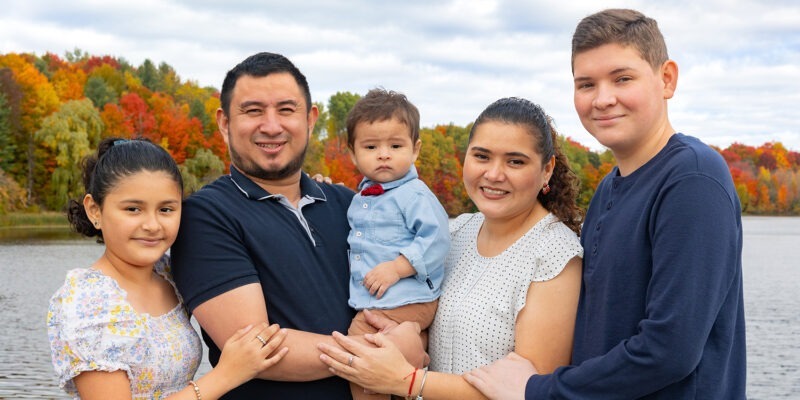Two years ago, Ada Espinoza arrived in the United States alongside her husband and two children. At that time, the family sought asylum due to the turmoil and violence in their home country, Nicaragua.
Their family’s well-being and health have always been paramount, so upon their arrival in the U.S., they took the initiative to enroll in health insurance through Espinoza’s employer.
However, since the family is in the process of securing a more permanent immigration status, they do not qualify for a subsidized healthcare plan through the Marketplace or a state-funded Medicaid plan.
“We pay approximately $200 per week to access healthcare coverage,” she explained. “And that doesn’t even cover deductibles.”
Recently, Espinoza had to take her 15-year-old son, Joseph Osorio, to the dentist for a cleaning and a few fillings. The work was not extensive, but it still resulted in a bill of more than $900.

Photo credit: Isabel Lopez Slattery
Espinoza and her husband work in a factory in Hart, Michigan, operating machinery. They do not earn enough to pay the bill up front, so they have set up a payment plan and are hoping to finish paying it off by the end of the year.
Espinoza has experienced the difference that access to Medicaid can have on her family. Her youngest child was born in the United States and is a citizen. Because the family meets the income eligibility requirements for Medicaid, Espinoza’s one-year-old is able to access this state-funded healthcare plan.
“With the baby, I can access medicine without paying too much money but for ourselves and our son we have to pay for the care ourselves,” she explained.
Last year, Ada Espinoza’s son, Osorio, was granted lawful permanent resident status. However, despite being legally able to work and live permanently in the U.S., he was still unable to have his healthcare expenses covered by Medicaid.
In 1996, legislators passed the Personal Responsibility and Work Opportunity Reconciliation Act, which divided lawfully present immigrants into two categories: “qualified” and “non-qualified.” While immigrants who have been granted permanent residency are considered “qualified” under this law, most are still barred from accessing the state’s Medicaid or the Children’s Health Insurance Program (CHIP) until they have been in the country for five consecutive years.
This situation is about to change for around 3,000 children in the state of Michigan, including Osorio. In late July, over $26 million was allocated in the state’s forthcoming fiscal year budget to expand Medicaid access for immigrants holding green cards.

Photo credit: Isabel Lopez Slattery
This adjustment removes the requirement that children and pregnant individuals with lawful permanent resident immigration status must reside in the United States for five years before becoming eligible for Medicaid.
Susan Reed, the executive director of the Michigan Immigrant Rights Center, a WKKF grantee, has been advocating for this expansion for several years.
“This truly represents a gradual step towards our ultimate goal, which is health equity. Health equity must encompass coverage for all Michiganders, regardless of their immigration status,” she emphasized.
In Michigan, the Medicaid expansion will affect Latinx children the most because they represent a large share of those who are themselves foreign-born or are part of immigrant families. This group is more likely to be income-eligible for state and federal-funded health care coverage and is also more likely to be uninsured than children in other racial groups today. That’s according to Simon Marshall-Shah, senior policy analyst at Michigan League of Public Policy, a WKKF grantee.
He authored a report, funded by WKKF and published in November 2021, that educated stakeholders on the issue.
“We wanted to look at the impact (the expansion) could have on the state budget. So there is substantial federal matching that the state will receive to make this change. And we made the pitch for that as being a fiscally sound and responsible change that the state should be making,” Marshall-Shah said.
The new policy also enhances coverage for pregnant individuals with green cards.
Currently, Michigan covers this group as well as undocumented pregnant people with Medicaid, but only during their pregnancy. However, the change in eligibility will extend more comprehensive coverage to pregnant individuals with a green card, according to Marshall-Shah.

Photo credit: Isabel Lopez Slattery
“Now with this change, they will be able to be eligible and have that additional 10 months of coverage, which again is huge for maternal and child health outcomes really,” he said.
That change demonstrated to Reed the kind of care she has always believed all people deserve to have.
Expanding access to healthcare was not an overnight achievement. It required thoughtful investments from philanthropic partners, like the W.K. Kellogg Foundation, to sustain the efforts that eventually culminated in the Medicaid coverage expansion we now have in the state of Michigan.
WKKF Program Officer Tracie Coffman calls this playing the long game.
“It all started with us looking at the inequities we were experiencing in Michigan and it was clear that immigrant children were consistently showing up in the data as uninsured or underinsured,” she said.
The long game Coffman referred to involves building relationships with the community and having faith in their capacity to discover solutions to the problems that affect them.
In the case of immigrant children, the solution meant expanding healthcare eligibility, according to Marshall-Shah.
This change not only helps young children and their families, but also supports young adults who have sought asylum in the United States. Upon arrival, many of these minors are processed as asylum seekers and if they do not have family in the country, they are put in foster care in placements across the country.
“Michigan is one of the largest states for kids who are in federal custody,” Reed said. “When these young people age out of the system at 18 years old they come out of foster care or group homes with no real health coverage.”
While many of these young people have been granted lawful permanent resident status, up until now they would not have been able to access Medicaid.

Photo credit: Isabel Lopez Slattery
“This just compounds the incredible stress of that experience and this new policy addresses that for them,” she said.
Dr. Marijata C. Daniel-Echols, a program officer at the foundation, partnered with Coffman to support this work.
For her, expanding access to Medicaid to these children is about changing the context for children and families.
“We are dealing with race equity here and we can’t change race equity one program at a time but efforts towards policy change can make substantial shifts towards more equitable outcomes,” Daniel-Echols said.
The Michigan League for Public Policy estimates that anywhere between 3,000 and 4,000 kids will be able to access state-funded Medicaid or CHIP due to the change in policy.
“We’re in the business of helping vulnerable children and families and some of these children are in some of the most vulnerable families in our state,” Daniel-Echols explained.
Part of what makes these families vulnerable is the lack of stability they experience due to their immigration status, Reed says.
“These families struggle to access formal resources in the ways U.S. citizens don’t,” she added. “From applying to a driver’s license to obtaining a bank account — these immigrant families face additional barriers in the process.”
For now, Reed says she is hopeful that deciding whether or not to go to the doctor will no longer be a question that some immigrant families like the Espinozas have to face.
Ada Espinoza is eager for the new law to take effect, as it will finally relieve her and her husband of the burden of healthcare expenses.
With the expansion of the new change, Michigan joins 33 other states in the country that have eliminated the five-year waiting period for some immigrants with permanent residency.








Comments